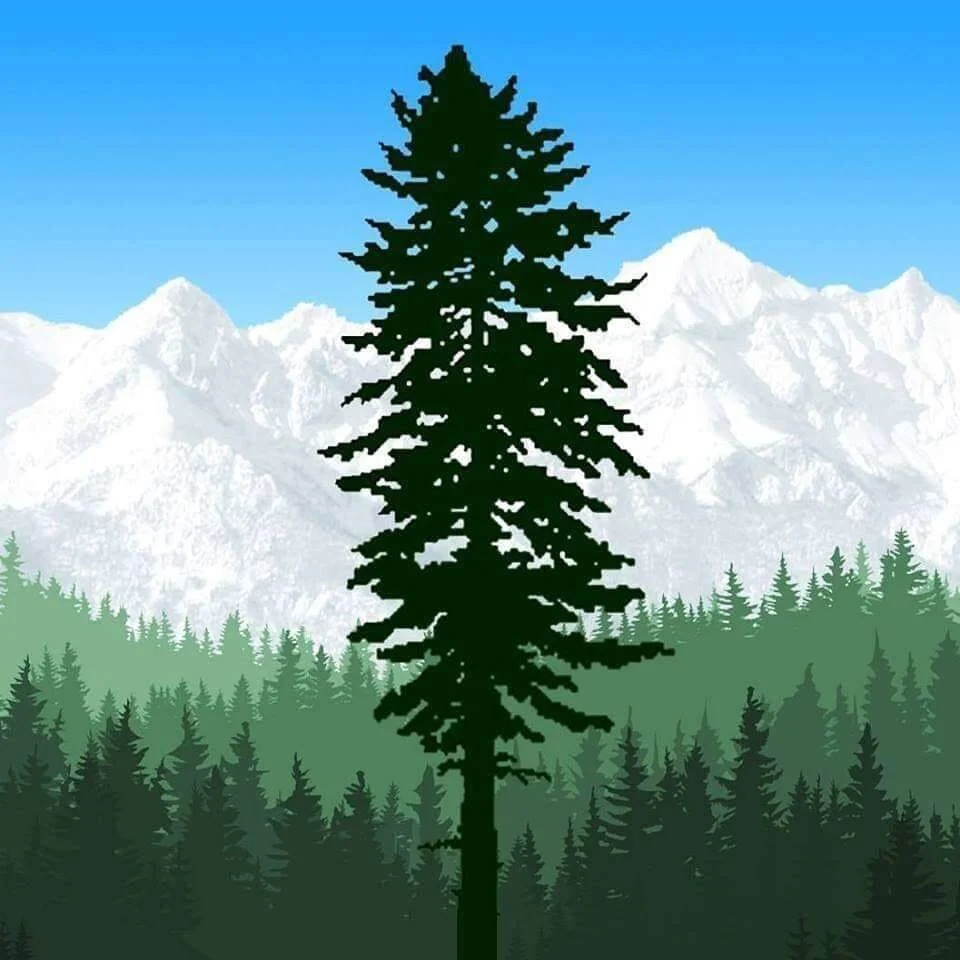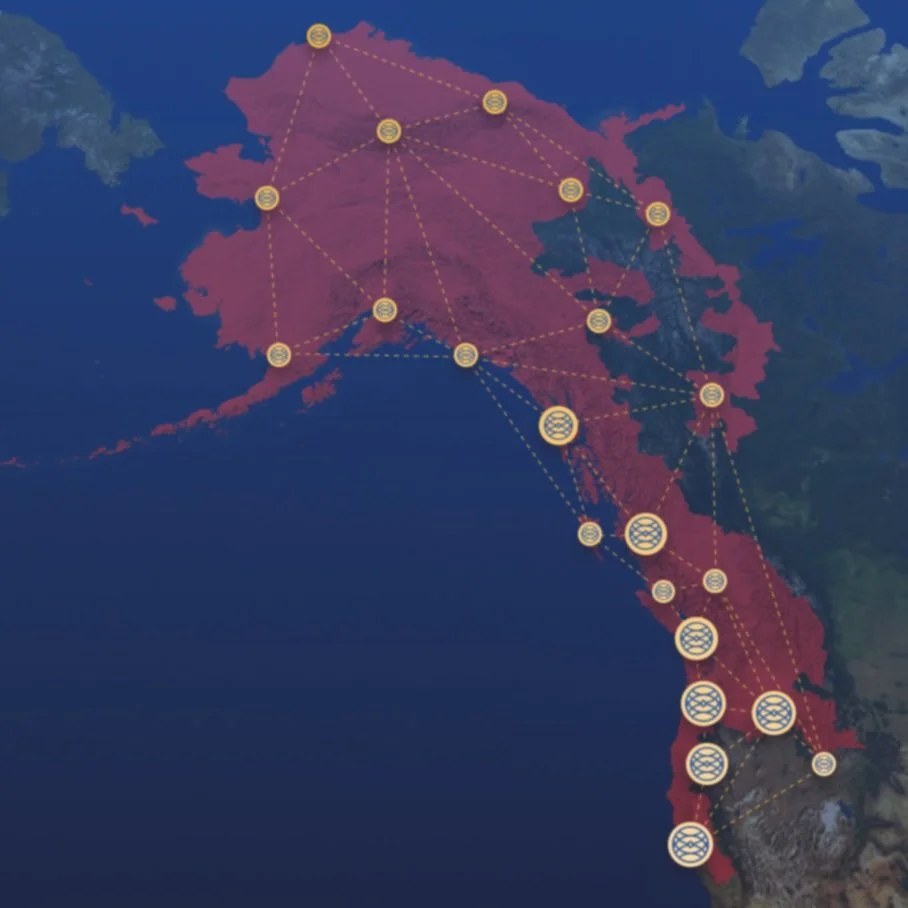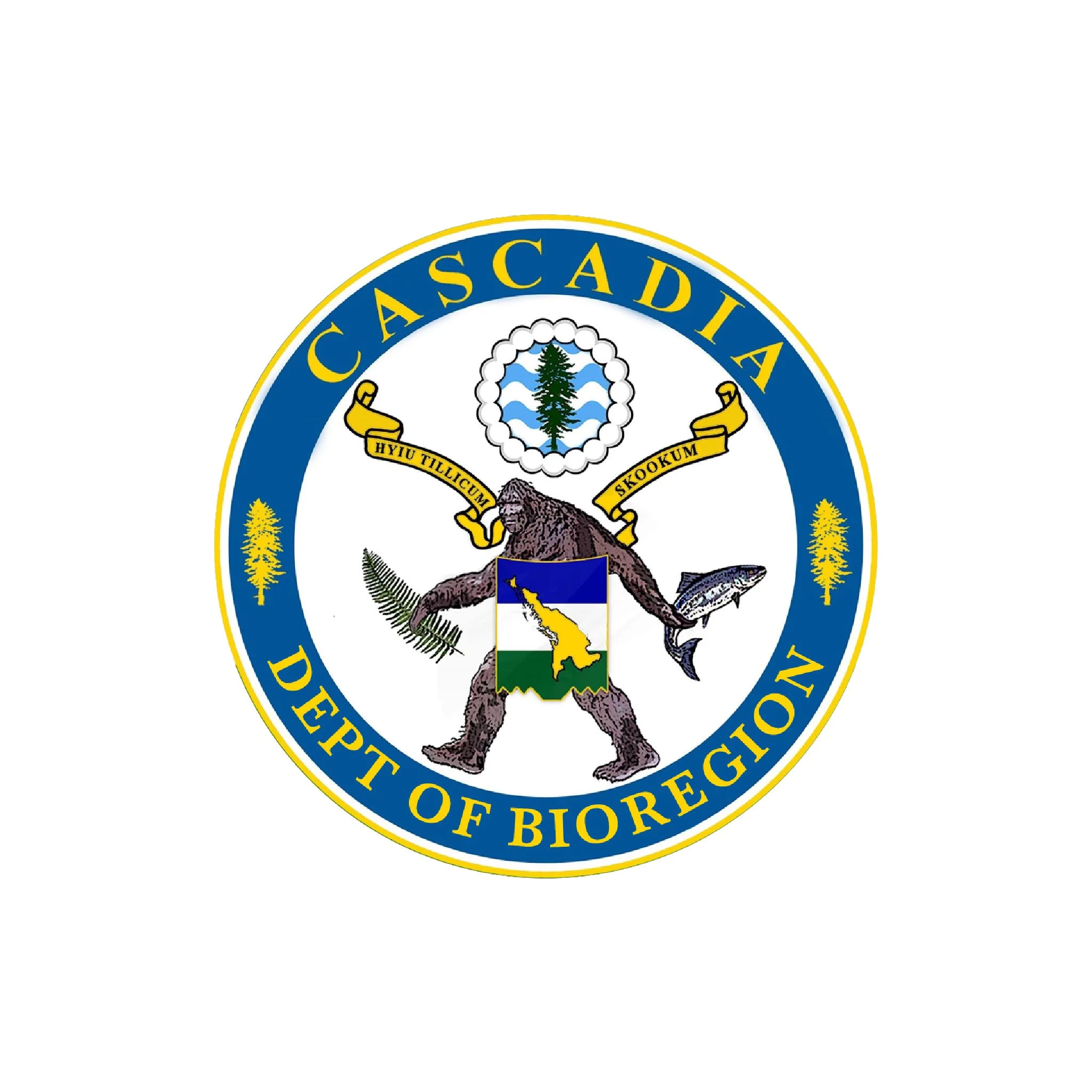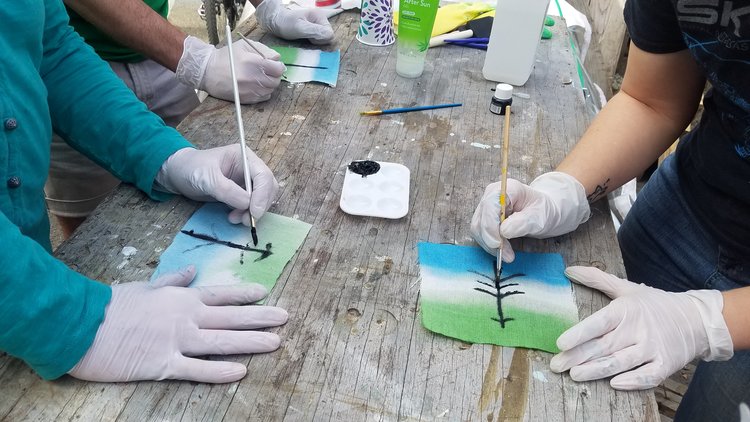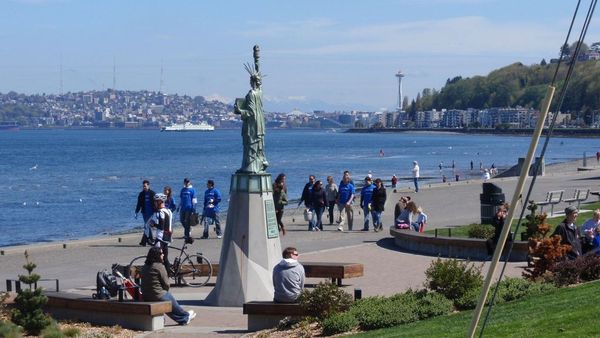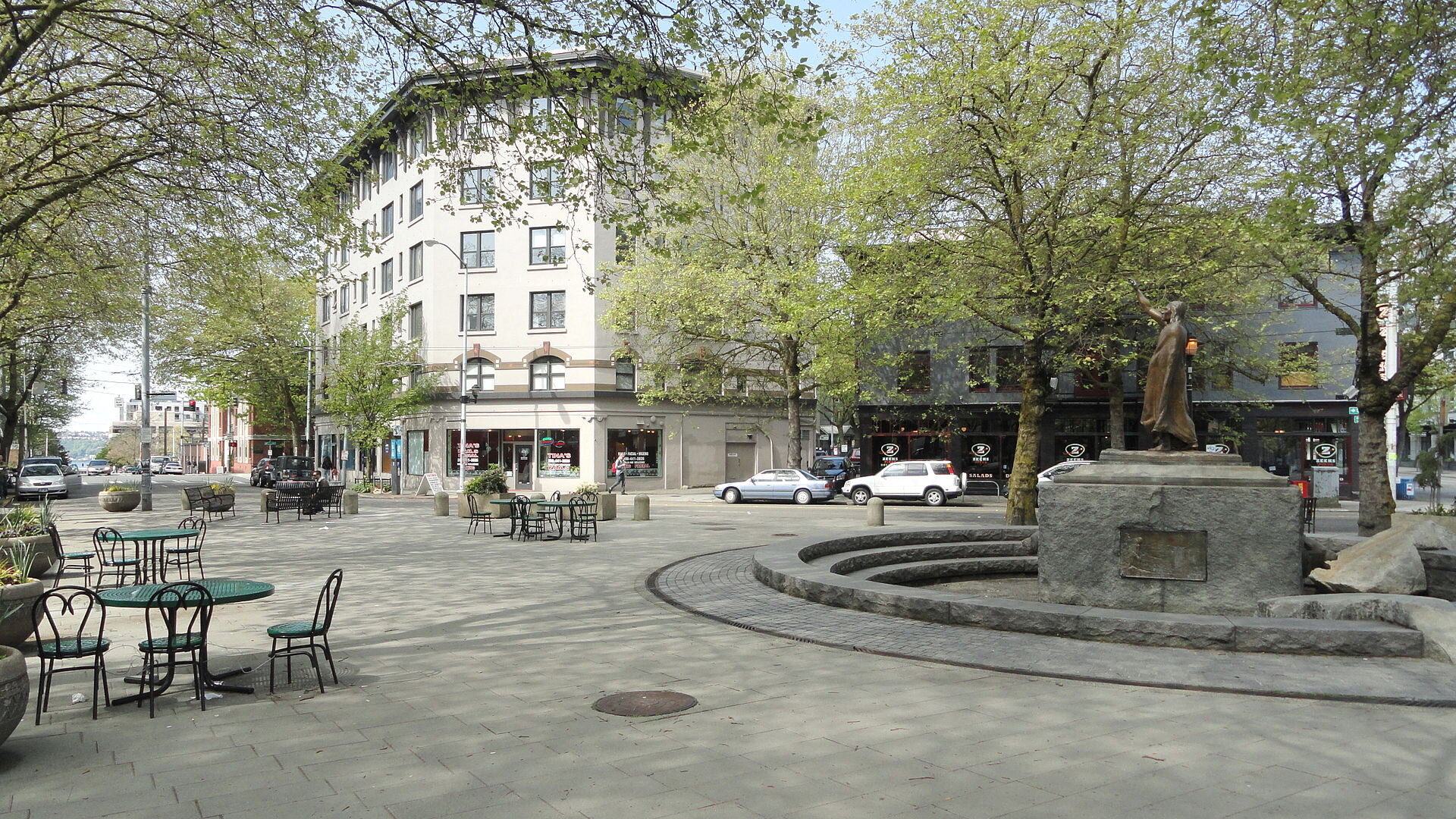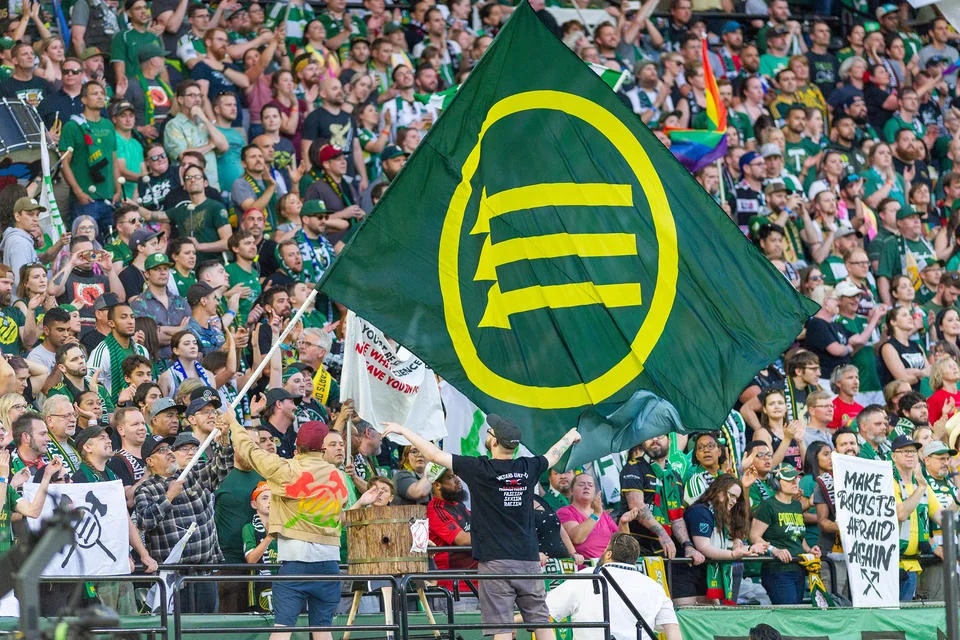Our November 2019 Diplomatic Corps Newsletter highlights our invitation for leaders, introduces Wesley D. Irwin as a new diplomat, presents the five departments we are organizing around and highlights changes to our website.
New Cascadia Membership Designs Are Here!
We love Cascadia, believe in bioregionalism as a philosophy to save our region and planet, and are tired of the craziness and insanity that has become commonplace in our world today. We want to be able to directly impact the issues that we care about, and so those living on this planet can have a real life and livelihood better than our own, rather than worse.
Your Chinook Wawa Word of the Day: Burdash
BURDASH
[BUR-dash] or [BAR-dash] — noun.
Meaning: Hermaphrodite; intersex; neuter; genderless.
Origin: Canadian French berdache > Italian bardassa > entering European languages via Moorish Spain from Arabic bardaj, “slave” > Persian bardah, “prisoner”.
In Chinook Wawa, the word burdash was commonly used to refer to accidental or incidental hermaphroditism or lack of gender, such as by castration, “burdash cayoosh” (gelding), and “burdash moos-moos” (steer), or unusual birth, as seen in “burdash kiuatan” (mule).
The word also saw extensive use as a sociological term for those that assumed the gender identity of the opposite sex. Alternative gender roles were widely shared feature of many native cultures, with documented examples in over 155 First Nations in the US and Canada. In about a third of these groups, a formal status also existed for females who undertook a man’s lifestyle, becoming hunters, warriors, and chiefs. They were sometimes referred to with the same term for male berdaches and sometimes with a distinct term—making them, therefore, a fourth gender. (Thus, “third gender” generally refers to male berdaches and sometimes male and female berdaches, while “fourth gender” always refers to female berdaches.)
Because so many First Nation cultures were disrupted, or had disappeared before they were studied by anthropologists, it is not possible to know the absolute frequency of these roles. Those alternative gender roles that have been documented, however, occur in every region of the continent, in every kind of society, and among speakers of every major language group.
“Berdache” had become the accepted anthropological term for these roles despite a rather unlikely etymology; it can be traced back to the Proto-Indo-European root *wela- “to strike, wound,” from which the Old Iranian *varta-, “seized, prisoner,” is derived. In Persia, it referred to a young captive or slave (male or female). The word entered western European languages perhaps from Muslim Spain or as a result of contact with Muslims. By the Renaissance it was current in Italian as bardascia and bardasso, in Spanish as bardaje (or bardaxe), in French as berdache, and in English as “bardash” with the meaning of “catamite”— the younger partner in an age-differentiated homosexual relationship. Over time its meaning began to shift, losing its reference to age and active/passive roles and becoming a general term for male homosexual. In some places, it lost its sexual connotations altogether. By the mid-nineteenth century, its use in Europe lapsed almost completely.
In North America, however, “berdache” continued to be used, but for a quite different purpose. Its first written occurrence in reference to third and fourth gender North American natives is in the 1704 memoir of Deliette. Eventually, its use spread to every part of North America the French entered, becoming a pidgin term used by Euro-Americans and native people alike.
Although there are important variations in berdache roles, they all shared a core set of traits:
Specialized work roles. Male and female berdaches were typically described in terms of their preference and achievements in the work of the “opposite” sex and/or unique activities specific to their identities.
Gender difference. In addition to work preferences, berdaches were distinguished from men and women in terms of temperament, dress, lifestyle, and social roles.
Spiritual sanction. Berdache identity was widely believed to be the result of supernatural intervention in the form of visions or dreams, and/or it was sanctioned by tribal mythology.
Same-sex relations. Berdaches most often formed sexual and emotional relationships with non-berdache members of their own sex.
The first use of the term in an anthropological publication was by Washington Matthews in 1877. In describing Hidatsa miáti he wrote, “Such are called by the French Canadians ‘berdaches.’” The next anthropological use was in J. Owen Dorsey’s 1890 study of Siouan cults. Like Matthews, he described “berdache” as a French Canadian frontier term, and following Alfred Kroeber’s use of the word in his 1902 ethnography of the Arapaho, it became part of standard anthropological terminology when discussing or referencing a person who identifies with any of a variety of gender identities which are not exclusively those of their biological sex.
In recent years the term has come to be considered offensive by many First Nations communities because of its pejorative and non-native etymology. In 1993, a group of anthropologists and natives issued guidelines that formalized these preferences. “Berdache,” they argued, is a term “that has its origins in Western thought and languages.” Scholars were encouraged to drop its use altogether, and instead use the word “two-spirit”, a modern word coined from the Ojibwa niizh manidoowag, or use tribal specific terms for multiple genders. Today the term “two-spirit” is identified as the preferred label of contemporary gay, lesbian, bisexual, and transgender native peoples.
Tsalxhaan - At the Northern border of Cascadia
In a continuation of our Native Placenames series we present Tsalxhaan. This mountain at the norther boundry of the Cascadian bioregion between Alaska and British Columbia represents one of the most dramatic peak faces in the world as it raises to 5,325 feet (4671 meters) a mere 13 miles (20 kilometers) from the sea shore.
Team Cascadia partners with Western Washington Premier League to build future team.
Our New Diplomat Departments Forming for 2020
As we enter into 2020, our Cascadian Diplomats are organizing themselves into six different core departments they have deemed to be the highest priority for building the Cascadia movement, the independence of the Cascadia Bioregion, building a network of bioregional movements around the world, and improve the well being and liveability of our bioregion.
Your Chinook Wawa Word of the Day: Alki
ALKI
[AHL-kee] (historical) or [al-KAI] (modern) — adverb.
Meaning: Eventually; someday; in the future; times to come; presently; directly; later; in a little while; after a while; shortly; will; shall;
Origin: Chinook alkekh > From a Chinookan particle álqi 'will be', ‘later on’
The word “alki”, appeared as the slogan on the seal of Washington Territory, and is the current state motto of Washington, and is usually translated as meaning "by and by", "soon", "hold on", and other connections to the future, or even as a way of saying “not so fast”. In ordinary use it is somewhat equivalent to the Mexican Spanish mañana, meaning sometime in the near future, or an indeterminate time away, perhaps never. It can be used as a verb auxiliary indicating the indefinite future tense, ‘shall’ or ‘will’, as seen in "mamook alki" (to delay; to defer), “wawa alki mamook” (postpone), or the expression "alki nika klatawa" (I will go presently), with the days of the week, and the number of weeks, months and years are also used to designate tenses.
The phrase “laly alki” can be used to mean "in a while" or "sometime soon" or another point in the immediate near future, as seen in "alki nesika klatawa kopa nika boat" (soon we will go in my boat) or "alki nika klatawa" (I will go soon) or "tenas alki" (in a little while).
The phrase "Iskum dolla, alki pay" (to borrow; to take out a loan) literally means get money, pay later, an apt expression if there ever was one. If you are struggling to learn something, you could confidently reassure someone by saying "nika kumtuks alki" ( I will understand eventually), while an appropriate closing to a letter would be “alki weght” (soon again).
The Statue of Liberty, or Lady Liberty, is a replica of the Statue of Liberty, installed at Alki Beach Park, in Seattle, Washington. It was installed in 1952 by the Boy Scouts of America and underwent a significant restoration in 2007 after repeated vandalism had damaged the sculpture.
This word is now firmly connected to Alki Point, the beach on the west Seattle peninsula where the city officially began in late 1851. Historical accounts say that entrepreneur Charles Terry wanted to name the tiny settlement New York, and that someone, either a well-wisher or doubter, added Alki to the name, with the connotation of "maybe someday".
Some time during the twentieth century the pronunciation of the second syllable changed from "kee" to "kai", likely during the prohibition era (1920 to 1933) due to the word’s similarity in sound to the slang term for an alcoholic (‘alkie’ or ‘alky’).
New fundraiser for Forests for Climate Resilience this Saturday in Portland, Oregon.
Join Forests for Climate Resilience and Forest Defenders for a gathering of #Forest Folk, Saturday in Portland, Oregon. The night will feature music, forest updates and movement news!
Calls for Justice from Catalonia - Lessons for Cascadia.
Your Chinook Wawa Word of the Day: Tillikum
TILLIKUM
[TIL'-i-kum] or [TIL'-LI-kum] — noun.
Meaning: Person; people; relative; relation; family; kin; kindred; ally; fellow; associate; folk; tribe; nation; population;
Origin: From Chinookan stems -lkh 'ground, earth' + t- 'plural' > Chinook tilikhum ‘people’
Commonly spelled “tillicum”, and sometimes pluralized in the English style as ‘tillikums”, the word means means “person” or “people,” and often has the connotation of a friend or relative, but has also come to signify a friend or ally. It usually means those who are not a “tyee” (chief), but rather common people, and can refer to any people and can be used to signify one’s social group, band, tribe, or even nation.
It can be used to describe one’s "ahnkuttie tillikums" (ancestors; ancient people), “cultus tilikum” (ordinary people; insignificant people; nobodies), or just "konaway tillikum" (everyone; everybody; humankind), be it "nesika tillikums" (our people) or "yaka tillikum" (their people).
“Klahowya tillikum” (hello, people; greetings, my friends/family) is a standard greeting in Chinook Wawa, and serves as a good way to address people you see in your “tillikum mitlite wake siah” (neighborhood), or even say to a "huloima tillikum" (stranger; foreigner; people of a different group) which one might encounter in a large "hiyu tillikum" (a crowd; a gathering; a throng). Of course if you just wanted to get the attention of a person or a group of people, you could simply shout "nah tillikums!" (hark people!).
Regarding other group activities, gathering with a group of friends to celebrate a “ahnkuttie tillikums klaska wawa” (tradition) makes for a good time, as does cheering for the “tillikum yaka tolo” (victor) of a game.
Conversely, people can take soluce by sharing "ahnkuttie tillikums yiem wawa" (tales spoken by the ancient people) during a “mahsh memaloose tillikum kopa memaloose Illahee” (funeral)
Anticipating "hiyu tillikums kopa house" (an audience), one might ask "kunsih tillikum mitlite?" (how many people are there?), and hopefully not hear “wake tilikum” (nobody).
Politicians often pass measures that are either “kloshe kopa hiyu tillikums” (popular) or “konaway tillikums halo ticky kahkwa” (unpopular) with the “kloshe kopa konaway tillikums” (public). Of course, someone with a position like the “tillikum yaka kloshe nanitch dolla” (treasurer) should try to remain “cultus kopa huloima tillikums (independent)
While many uses of the word describe "kahkwa tillikum" (friendly) relations, it is also used for a number of interpersonal conflicts; transients might be labeled “cultus tilikum” (vagabond), and group gathering might be divisively labeled “cultus tillikums” (rabble) or "solleks tillikum" (a mob).
During a war, a “pight tilikum” (warrior) would fight against the “solleks tilikum” (enemy), though sometimes this term would also be used as a substitute for “mesachie tilikum” (rascal; villain; sinner), the most heinous being labeled “hyas mesachie tilikum” (outlaw), who might quickly find themselves “halo tilikum” (friendless) or even a “tillikum kopa skookum house” (prisoner).
Spelled either as tillicum or tillikum, the word is a commonplace name across Cascadia:
A Tillicum Creek can be found near Huckleberry Mountain, Quartz Creek Butte, and Orwig Hump in Washington, as well as Chumstick Mountain and near Huron, Oregon.
Tillicum Beach located near both Yachats, Oregon and Langley, Washington, and a Tillicum Street exists in both Seattle and Vancouver.
There is a Tillicum Elementary School in both Steilacoom, Washington and Victoria, British Columbia, as well as a Tillicum Middle School located in Bellevue, Washington and a Tillicum Junior High School in Issaquah, Washington.
Tillicum station is a planned commuter rail station in Lakewood, Washington, in the historic Tillicum neighborhood, and scheduled to open in 2036 as an extension of the Sounder South Line from Lakewood station via the Point Defiance Bypass. The station would be located in the Tillicum neighborhood, near the intersection of Interstate 5 and Berkeley Street Southwest, adjacent to Joint Base Lewis–McChord.
Tilikum Crossing (also known as Bridge of the People) is a cable-stayed bridge across the Willamette River in Portland, Oregon. It was designed by TriMet, the Portland metropolitan area's regional transit authority, for its MAX Orange Line light rail passenger trains. The bridge also serves city buses and the Portland Streetcar, as well as bicycles, pedestrians, and emergency vehicles. Private cars and trucks are not permitted on the bridge. It is the first major bridge in the U.S. that was designed to allow access to transit vehicles, cyclists, and pedestrians but not cars.
Statue of Chief Seattle overlooking Tilikum Place. Cedar Street is in the background.
Tilikum Place is a small triangular plaza in the Belltown neighborhood of downtown Seattle, Washington which at the intersection of 5th Avenue, Cedar Street, and Denny Way, and features a life-size statue of Chief Seattle by local sculptor James Wehn.
Blake Island is believed to be the birthplace of Chief Si'ahl.
Tillicum Village on Blake Island, accessible from Seattle by ferry, is a famous visitor attraction that offers a Cascadian First Nation’s equivalent of a luau, complete with a stage show, for the hungry tourist. Bill Hewitt, a local restaurant owner, founded Tillicum Village in 1962, the year of the Seattle World's Fair. The Hewitt family operated it until selling it to Argosy Cruises, the operator of the Tillicum Excursion, in 2009. For 18 years, the show was Dance on the Wind, focusing on dances of the First Nations of British Columbia, provided by Thompson's, a locally based theatrical production company.
Tillicum Centre is a large shopping mall along Tillicum Road in Victoria, British Columbia.
The MV Tillikum, the sole remaining Evergreen State-class ferry operated by Washington State Ferries which since the retirement of her sister Klahowya in 2017, she has been serving primarily as the San Juan Inter-island vessel.
The CFAV Tillicum (YTM 555) is a 140-ton harbour tug of the Queen`s Harbour Master, stationed at CFB Esquimalt, on Vancouver Island.
The 1971 single "Tillicum", is a song performed by Canadian electronic music group Syrinx.
Tilikum (1981-2017), was a bull orca, enslaved by SeaWorld Orlando, that had been involved in the deaths of three of the park personnel.
Trillium ovatum var. Tillicum, is a variant of T. ovatum, a small flowering plant native to Cascadia.
2020 Cascadia Grains Conference scheduled for January 18 & 19 in Olympia, Washington
Coming Home: A New Map Telling a New Story of this Place
Your Chinook Wawa Word of the Day: Tyee
TYEE
[ty-EE' ] or [tahy-EE] — Noun, Adjective.
Origin: From Nootka Jargon tayi(s) < Nuu-chah-nulth tayi "elder", “oldest son”, "older brother", "senior"; allegedly resembles Inuktitut toyom "chief"
Meaning: boss; chief; foreman; gentleman; governor; an important person; landlord; leader; magistrate; manager; master; officer; a superior; any thing of superior order
Occasionally spelled ‘tyhee’ in some place names, and as ‘tayi’ in older publications, ‘tyee’ is one of the most commonly used and wide-spread words in Chinook Wawa. Originally used to only describe a chief or to differentiate nobility from the common people (tillikum), it would later be applied to any anyone or anything in a leadership position or other wise acts "kahkwa tyee" (kingly, like a king), as seen in “tyee lamel” (boss mule), “tyee kopa town” (mayor), "Tyee kopa Washington" (President of the United States), or “tyee klootchman” (matron; queen). The title of “Sagalie Tyee” is usually translated as "Great Spirit" or "God" but literally means "chief above".
The word ‘tyee’ can also extend to places, such as “tyee town” (metropolis), positions like “tyee kopa pepah house” (postmaster) or “tyee kopa court” (judge), institutions like “tyee man klaska mamook law” (legislature), or actions like “mamook tyee” (govern) and “pight kopa tyee” (rebel; rebellion).
The title of “hyas tyee” (Great Chief; King; General) was traditionally used by Maquinna and Wickanninish, the two principal chiefs of the Nuu-chah-nulth First Nation at the time explorers Vancouver and Bodega y Quadra made contact. This was also the title of the famous chiefs Khatsahlahno (of the Squamish) and Cumshewa (of the Haida), etc. and also of the British king or local governor. In later years, it could also mean a high company or government official or chief military officer. Today the title of “hyas tyee” could be applied to a senator, a longtime MP or MLA, or a business magnate with a strong local powerbase, long-time connections, and wealth from and because of the area.
The title “Hyas Klootchman Tyee” (Great Woman Ruler) translates roughly to "Her Majesty", and was used to refer to Queen Victoria in public proclamations during her reign. In theory, this title also applies to Queen Elizabeth II but it is no longer used by the BC government.
Occasionally it could be used as an adjective, as seen in "kahkwa tyee" (kingly; like a king), or "tyee salmon" (king salmon), a term still used today in the Campbell River-Johnstone Strait region to refer to a large spring Chinook salmon of extraordinary size, usually anything weighing more than 13.5 kg (29.76 lbs).
Tyee is an extremely common name for places and businesses, with the spelling Tyhee occasionally showing up in Idaho and some parts of British Columbia. Tyee Drive is located on Point Roberts, while there is a Tyee Court in Vancouver, BC and a Tyee Road in Victoria, BC. Tyhee Elementary School is located in Bannock, ID, while Tyee Middle School and Tyee High School are located in Washington. The Tyee Restaurant and Motel, established in 1926, is located in Coupeville, WA, while Oregon has Tyee Camp, along with Tyee Wine Cellars and Tyee Lodge, just to name a few.
There is a popular BC news site named The Tyee, and beginning in 1900, Tyee was also the title of the University of Washington Yearbook.
Your Chinook Wawa Word of the Day: Cosho
COSHO
[ko'-SHO] or [KU'-shu] — noun.
Meaning: Hog; pig; swine; pork; ham; bacon.
Origin: French, le cochon, ‘pig’
“Oink, oink indeed,” said the Harbor Seal.
Sometimes rendered as gosho, legosho, or lecosho in older sources, “cosho” (with the accent on the second syllable) was a French loanword used to mean pig or swine, but by context can be said to refer to the meat of the animal, though if one wanted to specify they could say "cosho itlwillie" (hog meat; pork).
Variants included "klootchman cosho" (sow pig), “tenas cosho” (piglet), and "cosho glease" (lard) as well as “wawa kahkwa cosho” (squeal), covering the famous line of the Hog Industry, “konaway ikta pe wawa kahkwa cosho” (everything but the squeal).
The word is also used in “siwash cosho” (aboriginal pig) used to refer to the meat of a seal, being somewhat similar in appearance, if not in taste, to that of swine, and was as much a staple of coastal First Nation life as pork was to the British or the Americans. It's worth noting that this expression was purely a jargon creation, and an equally prevalent word used throughout the region was “olehiyu” (seal), which was of Chinookan origin.
First Annual Cascadia Food Festival - Saturday October 5th in Vancouver, Washington
Taste the Region and Explore Food Connections at the Food and Cider Festival, Slow Food Summit, and Cascadian Luau during this all day event brought to you by Slow Food Cascadia. Join us as we build a just, craft, regenerative food movement in the Cascadia region, and raise funds to support farm-to-food bank program.
Cascadia Center for Leadership opens 2020 Application Cycle
THOSE WHO PRESERVE THE PAST, AND THOSE WHO DESTROY THE FUTURE: The Tragedy of the Southern Oregon Historical Society
Your Chinook Wawa Word of the Day: Delate
DELATE
[de-LATEY'] or [de-LEYT'] — adjective, adverb.
Meaning: accurate; authentic; certain; correct; correctly; direct; exact; definite; definitley; genuine; just; straight; plain; precise; real; really; sincere; sincerely; sure; thorough; true; truely; upright; undoubted; verily; very; without equivocation; without hesitation.
Origin: Either a corruption of English, straight; or Norman French drette > standard French droite ‘right’, both the directional and legal senses.
In Chinook Wawa, ‘delate’ is used as a superlative, which when added makes a statement positive and removes any element of doubt. Phrases like "delate nika wawa" (I am speaking the truth), "delate siah" (a very great distance), or "delate kwinnum cole ahnkuttie" (exactly five years ago) illustrate that anything ‘delate’ is the genuine article.
‘Delate’ can emphasize the quality of something, as in "delate kloshe" (very good; exquisite; pure; perfect) and "delate kahkwa” (exactly the same; identical), "delate chee" (entirely new), or “delate kimtah” (the last).
It serves as an affirmative, such as in “delate klosheh” (very good; right on), "okoke delate" (that is right; it is correct), “nawitka, delate kloshe” (yes, perfect), and "delate hyas kloshe" (majestic; magnificent; awe-inspiring).
Alternatively, it can emphasize a negative, such as “delate cultus” (absolute worthlessness; useless; mean), “wake delate" (not right; imperfect; deformed), "delate halo ticky" (to detest; dislike), “delate hyas mesachie” (terrible; terror), or if something is "delate kimtah kloshe" (very worse; worst), or declare that something or someone is being at “wake delate mamook” (fault) of something.
It can be used in the directional sense, such as "klatawa delate" (to go straight ahead; continue on), when describing size, as seen in "delate hyas" (enormous; immense; stupendous), emphasizes an exact time, such as "delate tenas sun" (dawn; daybreak), and of course all-important baking instructions, ranging from “delate tenas" (just a little) to "delate pahtl" (full to the brim; chockfull).
It can be used to express genuine feelings, such as "delate sick tumtum" (grief; very sad; very sorry) and the expression "delate nika sick tumtum" (I am very sorry), or tell someone that something is “delate ticky” (really necessary) or state if one has "halo delate kumtuks" (doubt, uncertain; obscure).
If you “mitlite delate kloshe tumtum kopa” (adore) something, you might describe it as being “delate hyas kloshe” (magnificent; majestic; awe-inspiring; very good) and that "nika tumtum delate kloshe" (my heart is very glad).
If a process results in "halo delate mamook" (not right work), one needs to "mamook delate" (to make right; correct) and “mamook delate kloshe (refine) the process in order for it to “delate kumtuks” (prove) useful.
If one is "delate yaka kumtuks" (an expert) and can "delate kumtuks" (know for a certainty; to be sure; to prove), then it is easy to "wawa delate" (speak the truth; speak correctly; affirm), especially if one is a “man yaka delate nanitch” (eyewitness) to something.
A skilled “man yaka delate kumtux potlatch wawa” (orator) will not likely “halo delate wawa” (mispronounce) words when speaking, though it will be up to the listener to determine if what they say is "delate wawa" (fact; promise; direct talk; straight truth) or “wake delate wawa” (legend; fiction; fable).
Just like the French word it is based on, ‘delate’ applies to both the legal sense, as in "delate yaka illahee" (a native of a country; one's native land), and in the physical sense, with a Delate Creek existing in Washington, Oregon, and Idaho each.
This Delate Road is located just outside of Poulsbo, Washington, across from Seattle on the Olympic Peninsula. There are many roads and streets with Chinook Wawa names in Cascadia.
MLS withdraws prohibition of Anti-Fascist "Iron Front" Symbol in Victory for Cascadia Supporter Groups
In a victory for the Cascadia Major League Soccer supporter groups, the Major League Soccer federation has rescinded a prohibition on the use of the anti-fascist Iron Front symbol as they work with fans to rewrite their code of conduct. The symbol was recently banned, with the league trying to claim that it violated it’s code of conduct because it was a ‘political statement’. Supporter groups have countered that being pro-human rights, as well as being tolerant and inclusive of all individuals, regardless of their race, religion or skin color, is hardly political.



